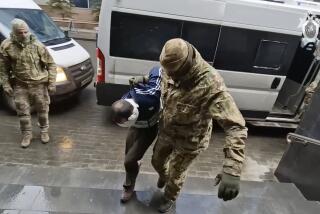Russian investigators delve into bus bombing in Volgograd
MOSCOW -- Investigators were delving into the background of a woman from the restive Caucasus region who is believed to have set off a suicide bomb Monday aboard a crowded bus in the southern Russian city of Volgograd. Six passengers and the bomber were killed and 33 people were injured.
It was the latest instance of violence from the Caucasus, fueled by nationalism and Islamic extremism, spilling over into other parts of Russia.
Authorities identified the bomber as Naida Asiyalova, 30, a resident of the Russian republic of Dagestan. They said she was believed to be the wife of a North Caucasus rebel, a man she reportedly met in college and may have recruited to join the separatist movement.
“This woman wearing a head scarf entered the bus at a bus stop, and shortly after, an explosion happened,” Vladimir Markin, spokesman for Russia’s Investigative Committee, said in televised remarks. “This was confirmed by a woman who survived.”
He said the investigation was focusing on crimes includig terrorism, murder and illegal arms possession.
The Rossiya-24 television news channel ran dramatic footage of the bus, moving at moderate speed, first shaken by an impact, with flames shooting out from its right side, then engulfed in a cloud of smoke as debris from the explosion flew in all directions.
“People were falling and jumping out of the bus,” said a witness, who gave his name only as Ivan, speaking by phone with Rossiya-24. “They were in shock and some were bleeding.”
The video shows passengers jumping out of a nearby vehicle and running from the scene, then stopping and returning to help the injured out of the bus.
The victims were mostly students of Volgograd State University, according to the online publication Gazeta.ru.
The Investigative Committee said Asiyalova had attended a university in Moscow in recent years, where she met a young Russian man, Dmitry Sokolov, whom she secretly married and persuaded to go to Dagestan and join the ranks of the separatist movement.
Sokolov, 21, reportedly went missing in Dagestan in 2012. His parents appeared on a television show, “Wait for Me,” on which they appealed to their son to return.
According to the online publication Kavkazpress.ru, Sokolov became involved as a college student with Wahhabism, a radical branch of Sunni Islam, and sought contacts with radicalized Islamist activists.
Sokolov is reportedly leading an underground armed resistance cell in Makhachkala, the capital of Dagestan, a city that came under scrutiny recently because of the Boston Marathon bombing. One of the Boston suspects, Tamerlan Tsarnaev, spent time there in 2012, and his parents still live there.
President Vladimir Putin expressed “deep condolences” to the families of those killed Monday and wished the injured a speedy recovery, his spokesman, Dmitry Peskov, said.
Volgograd regional Gov. Sergei Bazhenov called a three-day period of mourning and ordered monetary compensation for the victims.
Volgograd, the former Stalingrad, is an industrial regional capital about 600 miles southeast of Moscow, not far from the volatile North Caucasus region. In recent years, tens of thousands of North Caucasus residents have moved to other parts of Russia to escape the violence. Thousands settled in the Volgograd region.
Female suicide bombers, often referred to in Russia as black widows, have committed numerous attacks across the country since 2000, when Putin moved to crush a rebellion in Chechnya, another republic in the North Caucasus, with a massive military operation.
In March 2010, two young women from Dagestan blew themselves up in Moscow subway trains, killing 40 people and injuring more than 100.
After a decade of anti-terrorism measures, Russian citizens are still defenseless against such attacks, said Gennady Gudkov, an opposition leader and a former lawmaker in charge of security.
“What happened in Volgograd today happens on a daily basis all over the North Caucasus,” Gudkov, a former KGB and Federal Security Service officer, said in an interview. “The authorities have so far failed to find a mechanism to protect their citizens from the terrorist threat.”
ALSO:
After ‘soap opera’ search, Bank of Israel gets a governor
Egypt: Shooting outside Coptic church in Cairo kills three
Peru vows to investigate report of massive dolphin slaughter
More to Read
Sign up for Essential California
The most important California stories and recommendations in your inbox every morning.
You may occasionally receive promotional content from the Los Angeles Times.










